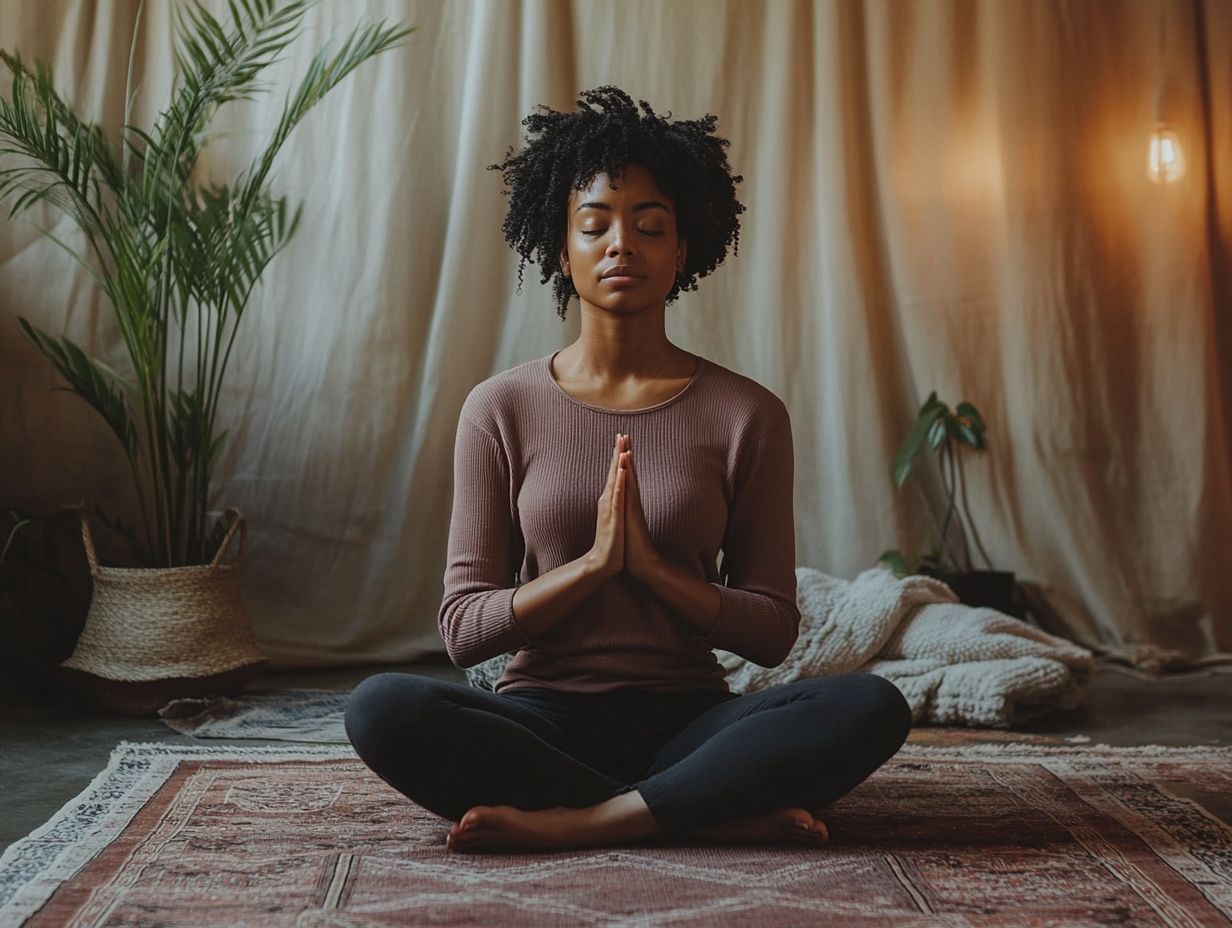What Should I Do During an Anxiety Attack?
Anxiety attacks can be overwhelming and frightening. They often leave you feeling lost and unsure of how to cope. Understanding the causes and triggers is your first crucial step toward managing these episodes effectively.
This guide provides immediate steps you can take during an anxiety attack, including grounding techniques and breathing exercises. It delves into long-term strategies and emphasizes the importance of support systems while offering practical tips to prevent future attacks.
Equip yourself with the knowledge and tools necessary to regain control over your anxiety and navigate through life with greater confidence!
Contents
- Key Takeaways:
- Understanding Anxiety Attacks and Panic Disorders
- Immediate Steps to Take During an Anxiety Attack
- Long-Term Strategies for Managing Anxiety Attacks
- Support Systems for Dealing with Anxiety Attacks
- Preventing Future Anxiety Attacks
- Identifying and Addressing Triggers
- Self-Care Practices
- Frequently Asked Questions
- What Should I Do During an Anxiety Attack?
- Should I try to fight the anxiety attack or let it happen?
- Can I use medication to help with an anxiety attack?
- What are some grounding techniques I can use during an anxiety attack?
- Is it normal to feel physical symptoms during an anxiety attack?
- Should I reach out for help during an anxiety attack?
Key Takeaways:

- During an anxiety attack, use grounding techniques like focusing on your senses or repeating a mantra to bring yourself back to the present.
- Breathing exercises, like deep belly breathing, help calm the physical symptoms of an anxiety attack.
- Consider therapy and lifestyle changes, such as mindfulness and exercise, for long-term management of anxiety.
Understanding Anxiety Attacks and Panic Disorders
Understanding anxiety attacks is essential for recognizing the symptoms and managing the distress they can provoke. Anxiety attacks, often linked to anxiety disorders, exhibit a range of physical and emotional manifestations. These include panic attacks, chest pain, shortness of breath, and an overwhelming sense of dread.
You might also experience dizziness, sweating, and a racing heartbeat. These symptoms can heighten your fear and lead to avoidance behaviors. Identifying these signs early can significantly improve your ability to cope and seek the right support, allowing you to embrace life more fully despite the challenges of panic disorder.
Causes and Triggers
Understanding the causes and triggers of panic attacks is crucial if you’re grappling with anxiety disorders. These factors can sway the frequency and intensity of your monthly episodes.
Genetic predisposition plays a pivotal role; if you have a family history of anxiety disorders, you might find yourself more vulnerable. Stressful life experiences like trauma, major life changes, or prolonged stress can serve as powerful catalysts for panic episodes.
Research highlights an imbalance in brain chemicals that affect your mood, such as serotonin and norepinephrine. These elements weave together, creating a complex web contributing to the onset of panic disorder, which may manifest through symptoms like rapid heartbeat, dizziness, and overwhelming fear.
Immediate Steps to Take During an Anxiety Attack
When you experience symptoms of a panic attack, taking immediate steps can significantly alleviate your distress and potentially prevent the situation from worsening.
This highlights the importance of knowing how to respond effectively in such moments.
Grounding Techniques
Grounding techniques are effective strategies for anyone experiencing panic attack symptoms. They help you regain focus on the present moment and alleviate feelings of anxiety.
By employing methods like deep breathing, progressive muscle relaxation, or engaging your senses through mindful observation, you can create a safe mental space. Self-help literature emphasizes the significance of identifying your physical sensations, encouraging you to acknowledge your surroundings rather than being overwhelmed by intense emotions.
Simple practices, like counting objects in a room or reciting affirmations, can provide a sense of control during an anxiety episode. These approaches promote relaxation and empower you to reclaim your composure, making it essential to explore and incorporate these strategies into your daily routine.
Consider seeking further help or reading additional resources to support your journey!
Breathing Exercises

Breathing exercises serve as an essential tool for managing panic attacks. They enable you to regulate your body’s response and alleviate distressing symptoms such as shortness of breath and a racing heartbeat.
These techniques encourage you to focus on your breath. This effectively interrupts the cycle of anxiety and ushers in a sense of calm.
Techniques such as deep belly breathing, box breathing, and the 4-7-8 method stand out as particularly effective strategies. By consciously slowing down your breathing patterns, you can lower your heart rate and diminish feelings of distress.
Incorporating these exercises into your routine enhances their effectiveness. As you grow more familiar with these techniques, using them during critical moments becomes second nature, fostering a deeper sense of control and well-being.
Long-Term Strategies for Managing Anxiety Attacks
Long-term strategies for managing anxiety attacks encompass a thoughtful blend of therapeutic approaches, prescribed medications, and impactful lifestyle changes. Together, these elements can transform your life and reduce panic episodes.
Therapy Options
Therapy options like cognitive behavioral therapy (CBT) and working with a mental health specialist can be incredibly effective in managing panic disorder and easing anxiety attacks.
These methods empower you to develop coping strategies and challenge the negative thought patterns that often fuel anxiety. CBT, in particular, utilizes techniques such as exposure therapy and cognitive restructuring, which means changing negative thoughts into positive ones, helping you confront your fears and reshape your thinking.
Mental health specialists play an essential role in diagnosing anxiety disorders. They use assessments and interviews to create tailored treatment plans that cater specifically to your needs.
When paired with prescribed medications, such as antidepressants or anti-anxiety medications, therapy can significantly enhance the overall effectiveness of your treatment. This leads to a more comprehensive and holistic approach to recovery.
Lifestyle Changes
Implementing lifestyle changes, such as regular exercise and relaxation techniques, can significantly impact your ability to manage anxiety attacks. These changes enhance your overall mental health.
Incorporating these practices into your daily routine not only boosts your physical well-being but also fosters a more balanced emotional state. Engaging in regular exercise whether it’s a brisk walk or a session of yoga releases endorphins that can elevate your mood and diminish stress.
Exploring relaxation techniques like meditation or deep-breathing exercises can further ground you during anxious moments.
If you’re eager to adopt these enriching habits, dive into a treasure trove of self-help books waiting to empower you! These resources are brimming with insightful strategies, practical tips, and expert advice to help you weave these changes seamlessly into your life. By tapping into these resources, you can take meaningful steps toward a healthier, more fulfilling lifestyle.
Support Systems for Dealing with Anxiety Attacks
Establishing a robust support system is essential for anyone grappling with anxiety attacks. It offers not only emotional reassurance but also practical assistance in navigating the complexities of panic disorder and its associated challenges.
Building a Support Network

Building a robust support network is crucial for anyone navigating the challenges of panic disorder. It offers both emotional and practical assistance during anxiety attacks. This network typically includes family members, close friends, and even professionals, each contributing uniquely to fostering a safe environment.
Friends can provide a listening ear and encouragement. This makes it easier for you to express your feelings, while family members offer a sense of stability and understanding during tough times.
Mental health specialists, such as therapists or counselors, bring invaluable knowledge and techniques that can significantly enhance your coping strategies.
Engaging in talking therapies, like a type of talk therapy that helps you change negative thoughts and behaviors, allows you to delve deeper into your disorder. It equips you with essential tools to manage and reduce anxiety.
This approach not only fortifies your coping mechanisms but also strengthens your overall support system. It paves the way for a more resilient you.
Seeking Professional Help
Seeking professional help from a mental health specialist is an essential step for anyone grappling with panic disorder. It opens the door to effective therapy options and treatment plans.
Anxiety can often feel overwhelming and isolating. This makes it challenging for you to manage symptoms on your own. By collaborating with a qualified therapist or psychologist, you gain access to a thorough evaluation that can reveal the underlying causes of your anxiety.
These specialists are adept at pinpointing specific triggers and offering tailored therapeutic approaches. Options include a type of talk therapy that helps you change negative thoughts and behaviors, exposure therapy, or even medication management when necessary.
This personalized support not only gives you the power to confront your fears but also equips you with practical coping strategies. It fosters resilience and provides a clearer path toward recovery.
Therefore, seeking professional guidance is a crucial element in navigating the complexities of anxiety attacks and enhancing your overall mental well-being.
Preventing Future Anxiety Attacks
Take charge now! Prevent future anxiety attacks with a proactive approach. This involves identifying your triggers and implementing self-care practices that nurture your overall mental well-being.
By focusing on these strategies, you can create a more balanced and resilient mindset. This paves the way for a calmer, more fulfilling life.
Identifying and Addressing Triggers
Identifying and addressing your panic attack triggers is vital for managing anxiety disorders effectively. It reduces the chances of future episodes.
Engaging in self-reflection helps you uncover valuable insights into your emotional and psychological responses. This self-awareness enables you to pinpoint the specific situations or thoughts that spark feelings of anxiety.
Incorporating stress management techniques like mindfulness meditation or journaling can further assist you in recognizing these triggers. When you understand the root causes of your anxiety, you can implement coping strategies tailored to your unique experiences.
Ultimately, addressing these triggers proactively not only helps mitigate panic attacks but also fosters your overall emotional well-being.
Self-Care Practices
Incorporating self-care practices into your daily routine is essential when managing anxiety disorders. These strategies can significantly enhance your emotional well-being and build your ability to bounce back from tough times against panic attacks.
Regularly engaging in self-care not only alleviates anxiety symptoms but also cultivates a sense of control and stability in your life. Techniques like deep breathing exercises, mindful meditation, and progressive muscle relaxation can provide immediate relief during stressful moments, allowing you to regain clarity.
Maintaining a consistent exercise routine whether it’s a brisk walk or a calming yoga session releases delightful endorphins, naturally elevating your mood and reducing feelings of anxiety. Each of these practices plays a vital role in promoting a balanced mental state, highlighting just how crucial comprehensive self-care is for effective mental health management.
Frequently Asked Questions

What Should I Do During an Anxiety Attack?
Focus on your breath it really helps! Find a quiet, comfortable place to sit, relax your muscles, and take slow, deep breaths. This can calm your mind and body.
Should I try to fight the anxiety attack or let it happen?
It can be tough to stop an anxiety attack since it’s a natural response to stress and fear. Instead of fighting it, acknowledge and accept the feelings you are experiencing, and use coping strategies to manage them.
Can I use medication to help with an anxiety attack?
If you have been prescribed medication for anxiety, you may take it during an anxiety attack. However, it s best to consult with your doctor before making any changes to your medication regimen.
What are some grounding techniques I can use during an anxiety attack?
Grounding techniques that may help include focusing on your surroundings and describing them in detail, listening to calming music or sounds, and using a calming scent or object to help you relax.
Is it normal to feel physical symptoms during an anxiety attack?
Yes, it s common to experience physical symptoms during an anxiety attack, such as a racing heart, shortness of breath, and muscle tension. These symptoms are a result of your body’s natural response to stress and fear.
Should I reach out for help during an anxiety attack?
If you feel comfortable, reaching out to a trusted friend or family member can be helpful. They can offer support and help you feel calmer. However, it s also okay to take some time for yourself and work through the attack independently.
Don t hesitate to reach out for support you re not alone!






